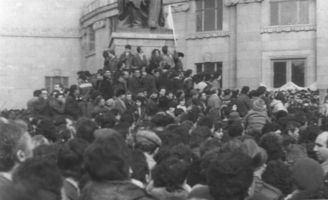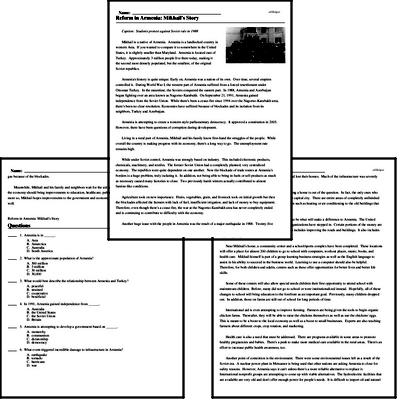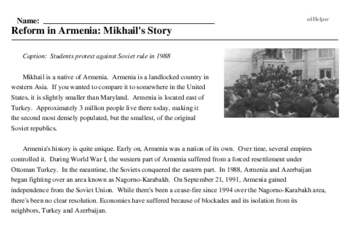Reform in Armenia: Mikhail's Story
Caption: Students protest against Soviet rule in 1988
Mikhail is a native of Armenia. Armenia is a landlocked country in western Asia. If you wanted to compare it to somewhere in the United States, it is slightly smaller than Maryland. Armenia is located east of Turkey. Approximately 3 million people live there today, making it the second most densely populated, but the smallest, of the original Soviet republics.
Armenia's history is quite unique. Early on, Armenia was a nation of its own. Over time, several empires controlled it. During World War I, the western part of Armenia suffered from a forced resettlement under Ottoman Turkey. In the meantime, the Soviets conquered the eastern part. In 1988, Armenia and Azerbaijan began fighting over an area known as Nagorno-Karabakh. On September 21, 1991, Armenia gained independence from the Soviet Union. While there's been a cease-fire since 1994 over the Nagorno-Karabakh area, there's been no clear resolution. Economies have suffered because of blockades and its isolation from its neighbors, Turkey and Azerbaijan.
Armenia is attempting to create a western-style parliamentary democracy. It approved a constitution in 2005. However, there have been questions of corruption during development.
Living in a rural part of Armenia, Mikhail and his family know first-hand the struggles of the people. While overall the country is making progress with its economy, there's a long way to go. The unemployment rate remains high.
While under Soviet control, Armenia was strongly based on industry. This included electronic products, chemicals, machinery, and textiles. The former Soviet Union had a completely planned, very centralized economy. The republics were quite dependent on one another. Now the blockade of trade routes at Armenia's borders is a huge problem, truly isolating it. In addition, not being able to bring in fuels or sell products as much as necessary caused many factories to close. Two previously harsh winters actually contributed to almost famine-like conditions.
Agriculture took on new importance. Fruits, vegetables, grain, and livestock took on initial growth but then the blockades affected the farmers with lack of fuel, insufficient irrigation, and lack of money to buy equipment. Therefore, even though there's a cease-fire, the war at the Nagorno-Karabakh area has never completely ended and is continuing to contribute to difficulty with the economy.
Another huge issue with the people in Armenia was the result of a major earthquake in 1988. Twenty-five thousand people were killed. Five hundred thousand lost their homes. Much of the infrastructure was severely damaged in the area as well.
For the average person such as Mikhail, affording a home is out of the question. In fact, the only ones who can afford to own a home are usually the rich in the capital city. There are entire areas of completely unfinished housing. There's also a need to bring basic upgrades such as heating or air conditioning to the old buildings that do exist.




